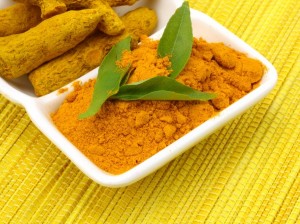By Sayer Ji
Contributing Writer for Wake Up World
A study from Zheijian Provincial People’s Hospital in Zheijiang, China indicates that a compound in turmeric known as curcumin, which gives the spice its characteristic saffron-like color, is capable of inducing programmed cell death (apoptosis) within triple negative breast cancer cells.[1]
Triple negative breast cancer (TNBC), so named because the cells do not have the characteristic receptors for estrogen, progesterone and Her2/neu, is considered the most treatment resistant, primarily because these ‘missing receptors’ are required for many of the most popular conventional treatments to work, e.g. Tamoxifen targets estrogen receptors. For this reason, TNBC is considered the most aggressive, the most likely to be treated with less-targeted (and therefore more toxic) forms of chemotherapy, and the soonest to return when treatment fails.
[pro_ad_display_adzone id=”110028″]
Approximately 15-25% of all breast cancer cases are triple negative. Unfortunately, however, the most visible non-profit foundation dedicated to bringing awareness to the condition, the Triple Negative Breast Cancer Foundation, is focused almost exclusively on raising awareness and money for a future pharmaceutical “cure” – much in the same way as its partner, Susan G. Komen, and the larger breast cancer awareness organization, Breast Cancer Awareness Month, act as if removing and addressing the obvious causes of cancer, e.g. carcinogenic chemical and radiation exposures, were not the first priority. For those suffering through or recovering from treatment right now, or trying to decide what to do with a new diagnosis, this latest Chinese study is promising.
Detractors, of course, point out that this latest curcumin research occurred on the level of a cell study, which in the pyramidal power structure of “evidence-based medicine,” where the randomized, double-blind and placebo-controlled human clinical study is the sole determinant of the ultimate truth, is the most insignificant, and least compelling as far informing treatment decisions. This view, however, is rather naive, insofar the criteria for determining a substance’s potential for future use as an FDA drug is not its effectiveness, safety or availability to those in need, rather, how proprietary and profitable the formula is to manufacture, distribute and market to consumers. The “gold standard” of evidence-based medicine therefore becomes literally: “those who own the gold make the standard.”
This is not the first study to reveal curcumin’s potential value in treating breast cancer. A growing body of experimental evidence clearly shows that curcumin provides a potential drug alternative. GreenMedInfo.com has indexed over 60 in vitro and animal studies demonstrating either curcumin’s direct anti-breast cancer activity, or, its ability to enhance breast cancer’s sensitivity to conventional chemotherapy. Also, the open access project has indexed over 1500 abstracts from the National Library of Medicine on its potential value in over 500 health conditions: Turmeric Breast Cancer.
Other pre-clinically confirmed natural candidates for combating triple negative breast cancer include:
- Blueberry
- Bee Propolis
For a far wider dataset on potential natural breast cancer solutions, and common avoidable causes, visit the GreenMedInfo.com Breast Cancer Research health guide: Natural Breast Cancer Research
Article Resources
[1] Xiao-Dong Sun, Xing-E Liu, Dong-Sheng Huang. Curcumin induces apoptosis of triple-negative breast cancer cells by inhibition of EGFR expression. Mol Med Report. 2012 Sep 26. Epub 2012 Sep 26. PMID: 23023821
Further articles by Sayer Ji:
- The Spice That Prevents Fluoride From Destroying Your Brain
- Turmeric Beats Ibuprofen for Arthritis of the Knee
- Roundup Weedkiller Found In 75% of Air and Rain Samples, Government Study Finds
- Live Flu Vaccines Increase Infectious Bacteria Counts 100-Fold in Mice
- FAIL: Another Mammography Study Finds They Don’t Save Lives
- MSG Proven Highly Toxic: 1 Dose Causes Headache In Healthy Subjects
- Black Seed Extract ‘Cures’ HIV Patient Naturally
- The Grain That Damages The Human Brain
- The Cancer-Causing Metal Millions Eat, Wear or Have Injected Into Their Kids
- Biophotons: The Human Body Emits, Communicates with, and is Made from Light
- The 2013 Measles Outbreak: A Failing Vaccine, Not A Failure To Vaccinate
- 3 Evidence-Based Ways To Reverse Skin Aging Naturally
- Why Is The Food Industry Poisoning Us With Trillions of Nanoparticles?
- How to Clean Your Arteries With One Simple Fruit
- 13 Evidence-Based Medicinal Properties of Coconut Oil
About the author:
 Sayer Ji is an author, researcher, lecturer, an advisory board member of the National Health Federation, and the founder of GreenMedInfo.com, the world an open access, evidence-based resource supporting natural and integrative modalities. His writings have been published and referenced widely in print and online, including Truthout, Mercola.com, The Journal of Gluten Sensitivity, New York Times and The Well Being Journal.
Sayer Ji is an author, researcher, lecturer, an advisory board member of the National Health Federation, and the founder of GreenMedInfo.com, the world an open access, evidence-based resource supporting natural and integrative modalities. His writings have been published and referenced widely in print and online, including Truthout, Mercola.com, The Journal of Gluten Sensitivity, New York Times and The Well Being Journal.
In 1995 Sayer received a BA degree in Philosophy from Rutgers University, where he studied under the American philosopher Dr. Bruce W. Wilshire, with a focus on the philosophy of science. In 1996, following residency at the Zen Mountain Monastery in upstate New York, he embarked on a 5 year journey of service as a counsellor-teacher and wilderness therapy specialist for various organizations that serve underprivileged and/or adjudicated populations. Since 2003, Sayer has served as a patient advocate and an educator and consultant for the natural health and wellness field.
[pro_ad_display_adzone id=”110027″]







